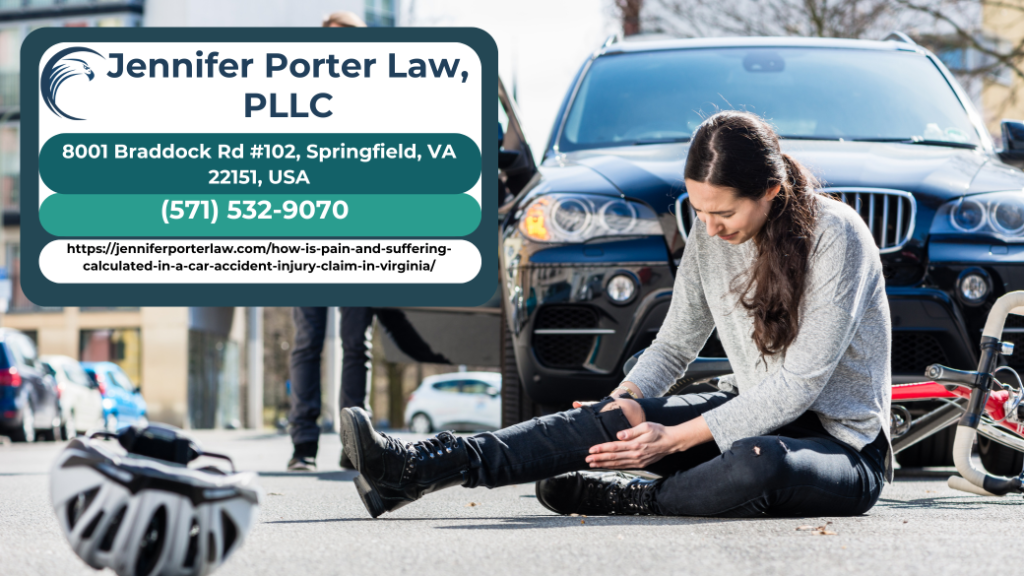When you have been injured in a car accident that was caused by the negligence of another person, you can seek compensation to offset the effects of the accident. This includes losses that are fairly easy to quantify, such as medical expenses and lost wages. It also includes future anticipated needs, which are a little more challenging to calculate but are still based on an economic scale. Your attorney can estimate how much you might need to pay for future medical care and how much your injuries might diminish your future earning capacity, even factoring in pre-existing conditions if present.
But how do you calculate the value of your pain, suffering, and other intangible losses? How do you put a price on suffering or determine the value of lost opportunities in your future? This is where the experience and skill of an attorney come into play. At Jennifer Porter Law, PLLC, our team of Northern Virginia car accident lawyers is well-versed in justifying the maximum compensation for these non-economic losses. While no amount of money can erase your pain and heartache, we can help you pursue financial recovery that provides a sense of justice and resources for the many future needs of yourself and your family. Contact us today at (571) 532-9070 to schedule a consultation.
Economic vs. Non-Economic Damages in Virginia Accident Claims
Before calculating damages for pain and suffering, discerning the differences between economic and non-economic damages is crucial when filing an accident claim. This distinction helps define the financial and emotional compensation victims can pursue following a car accident.
Economic damages encompass tangible losses that can be assigned a specific monetary value. These include medical expenses incurred immediately after an accident and projected future medical costs should ongoing care be necessary. Additionally, if the injury prevents a victim from working, both past lost wages and future lost earning capacity are considered economic damages. These figures are typically straightforward to document and quantify, which aids in their acceptance by insurance companies and in court.
In contrast, noneconomic damages cover the intangible impact of an accident, which is less quantifiable. These damages account for the pain and suffering endured by the victim, both physically and emotionally. The severity and extent of the injury help determine these damages, as they are subjective and vary widely from one case to another. Noneconomic damages recognize the broader, life-altering effects of an accident, acknowledging that the consequences extend beyond mere financial losses.
For anyone involved in a car accident in Northern Virginia, understanding these categories can guide their legal approach to seeking fair compensation. While economic damages offer a clear-cut calculation, noneconomic damages demand a thorough examination of the injury’s impact on the victim’s life and well-being.
| Category | Examples | Characteristics |
|---|---|---|
| Economic damages | Medical expenses, past and future lost wages, property damage, rehabilitation costs | Tangible and quantifiable using receipts or other documentation; easier to prove in court |
| Non-economic damages | Pain and suffering, emotional distress, loss of enjoyment of life, disfigurement, loss of companionship | Intangible and subjective; amounts vary widely by case and are harder to measure |
| Damage caps (exceptions) | Medical malpractice: $2,650,000 (July 1, 2024 – June 30, 2025); punitive damages: $350,000; claims against Virginia government: $100,000 | Most personal injury cases have no caps, but certain types of claims have statutory limits |
Northern Virginia Car Accident Lawyer Jennifer Porter

Jennifer Porter
With more than 25 years of experience representing injured individuals, Jennifer Porter is a seasoned trial attorney dedicated to helping car accident victims in Northern Virginia. Known for her sharp litigation skills and compassionate client advocacy, Jennifer has handled hundreds of personal injury cases involving serious and catastrophic injuries.
Jennifer brings a unique advantage to her personal injury practice, having previously worked as house counsel for Progressive Insurance and as defense counsel for several major national insurers. This insider perspective allows her to anticipate and counter defense tactics, maximizing recovery for her clients. Recognized as a Super Lawyer and AV Preeminent-rated by Martindale-Hubbell, Jennifer is licensed in Virginia, Maryland, Washington, D.C., and California, and remains an active leader in the Virginia legal community.
Types of Intangible Damages
Damages for “pain and suffering” are just one type of compensation you could receive for non-economic effects of your injuries. Often, the award allotted for noneconomic harm is far greater than the award provided for losses with a direct economic cost, such as lost wages or medical bills. This is why calculating the value of pain, suffering, and other intangible losses is so important.
What other types of intangible losses can you receive compensation for? Depending on the situation, you might receive compensation for the following:
- Emotional distress: This involves the psychological effects of the accident, such as fear and anxiety.
- Mental anguish: This includes emotional pain such as depression or PTSD.
- Disfigurement: If the accident caused visible scarring or other disfigurement, you can receive compensation for the effects.
- Loss of enjoyment: If the accident caused you to lose your enjoyment of travel or something broader, such as your ability to enjoy daily life, you can receive damages to offset the loss.
- Loss of consortium: If a spouse is no longer able to enjoy your company because you are suffering the effects of the accident, they may be compensated for that.
- Inconvenience: The time spent recovering and the efforts you must make to deal with the effects of the accident and your injuries is also worth something.
Sometimes, people lump all of the intangible factors together and refer to them all as “pain and suffering.” But to get the most from your claim, it makes sense to break down each factor and consider the many ways the accident has impacted your life. You can receive compensation for short-term suffering that eventually passes and the long-term effects you are likely to endure in the future.
Is There a Formula for Calculating Damages for Pain and Suffering?
The laws and courts in Virginia allow accident victims to recover compensation for pain and suffering, as well as other intangible losses, but they do not have a formula for establishing a value for these losses. In some cases, the law establishes a cap on noneconomic damages.
Just as with economic losses such as medical expenses, you are more likely to recover damages when you have evidence to demonstrate the extent of your losses. If you have a journal showing how the injuries affected your life on a daily basis, that can be very powerful. Statements from witnesses about how your life has changed since the accident can also demonstrate the harm you have suffered.
Your attorney might compare your specific losses with those in other cases to argue that legal precedent sets a value for each type of intangible loss. Insurance companies often try to use the “multiplier method” where they simply take your proven economic losses and use those as a basis to establish your intangible losses. But, even an injury with a small medical bill, such as a disfiguring scar that cannot be repaired through surgery, might have a significant personal impact for the rest of your life.
A car accident lawyer can look at the totality of injury effects and how they will impact your life in the days and years ahead. They also consider every aspect that contributes to your suffering. Then, the attorney can help ensure that the insurance company and the court understand the impact of these factors as well. Contact Jennifer Porter Law, PLLC today to speak with a skilled Fairfax car accident lawyer.

The Evidence Needed for a Strong Pain and Suffering Claim
In Virginia, claims for pain and suffering require more than personal accounts. Courts and insurance companies demand evidence that can be evaluated with reasonable certainty. Because pain is inherently subjective, the legal challenge lies in translating an individual’s experience into objective, verifiable proof that supports the claim. Strong evidence is also critical for justifying a higher multiplier in the damages calculation, which can result in a significantly larger settlement or verdict.
The Legal Standard in Virginia
Virginia law requires that pain and suffering be proven with reasonable certainty. This means more than stating that an injury hurts or that life is harder. The law expects a clear presentation of how the injury has affected day-to-day life, mental health, physical ability, and overall well-being. Evidence must be specific, consistent, and credible so that it can support a calculation of damages that reflects the severity and duration of the suffering.
Medical Records
Consistent medical documentation is the most important form of evidence in a pain and suffering claim. Records from doctors, physical therapists, psychologists, and other professionals provide a third-party account of the injury’s impact. These notes may include descriptions of physical limitations, emotional distress, and any diagnosis of chronic pain or mental health issues. Even when pain is not directly mentioned, the severity of the injury as documented in these records often allows pain to be inferred.
Pain and Suffering Journal
A personal journal can be a powerful supplement to medical records. This log should record daily experiences in detail, such as pain levels on a scale of 1 to 10, emotional changes like frustration or anxiety, and specific ways the injury interferes with daily life. Noting sleep disturbances, missed events, or the inability to complete routine tasks gives structure and depth to a claim that might otherwise be seen as vague.
Lay Witness Testimony
Statements from family members, friends, or colleagues can provide a clear picture of how an individual’s life has changed since the injury. These witnesses may describe behavioral changes, physical struggles, or a general decline in quality of life. Their observations support the broader narrative and help demonstrate the real-life consequences of the injury.
Expert Testimony
For more complex or long-term injuries, expert witnesses may be required. Medical professionals can speak to long-term outcomes, the likelihood of future pain, or the necessity of ongoing treatment. Mental health experts may offer diagnoses such as PTSD and explain how trauma has influenced the individual’s emotional health. In some cases, vocational experts are used to establish limitations on employment and income.
How Jennifer Porter Law, PLLC Can Help Fight for Maximum Recovery for Pain and Suffering
Most damages for pain and suffering are settled with auto insurance companies out of court. Because our team has extensive experience working for insurance companies, we know the arguments and evidence that are most effective in obtaining the right damage awards for our clients without the delays of litigation. However, we are always prepared to fight for the right result in court if necessary.
If you have questions about the damages for pain, suffering, and other intangible losses that may be available in your case, call us today at (571) 532-9070 for a free consultation and case evaluation.



